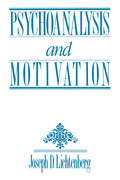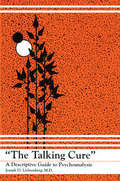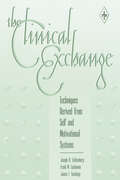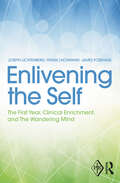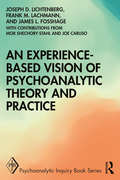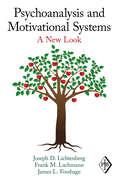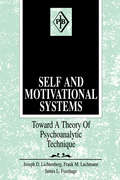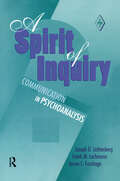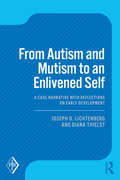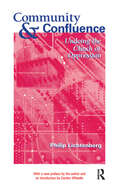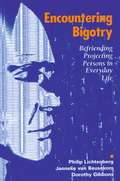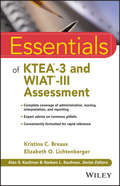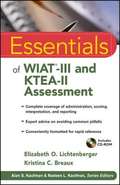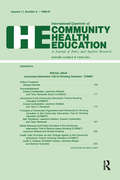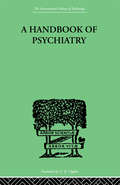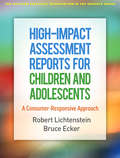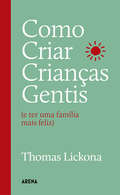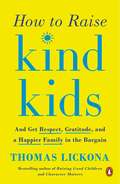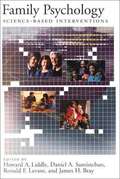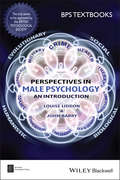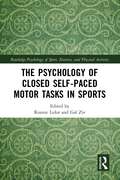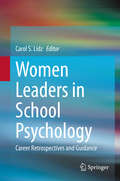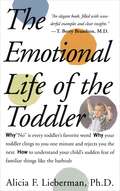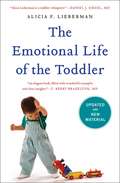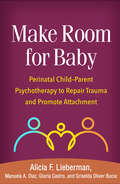- Table View
- List View
Psychoanalysis and Motivation (Psychoanalytic Inquiry Book Series)
by Joseph D. LichtenbergCarrying forward his inquiry into the nature and conditions of normal and abnormal development, Lichtenberg focuses on motivation. His goal is to offer an alternative to psychoanalytic drive theory that accommodates the developmental insights of infancy research while accounting for the entire range of phenomena addressed by the theory of instinctual drives. To this end, he propounds a comprehensive theory of the self, which then gains expression in five discrete yet interactive motivational systems.
The Talking Cure: A Descriptive Guide to Psychoanalysis
by Joseph D. LichtenbergAmong the many elementary expositions of psychoanalysis, "The Talking Cure" is unique in focusing on the actual analytic experience. Lichtenberg's approach is humanistic, demonstrating empathic understanding of the fears and hopes of the person seeking help. He provides a "feel" for what happens during the analytic voyage of self-discovery.
The Clinical Exchange: Techniques Derived from Self and Motivational Systems (Psychoanalytic Inquiry Book Series #16)
by Joseph D. Lichtenberg Frank M. Lachmann James L. FosshageIn this practical sequel to the same authors' Self and Motivational Systems (TAP, 1992), Lichtenberg, Lachmann, and Fosshage offer ten principles of technique to guide the clinical exchange. These principles, which pertain equally to exploratory psychotherapy and psychoanalysis, integrate the findings of self psychology with recent developmental research that has refined our understanding of the self as a center of experience and motivation. The ten principles of technique not only provide a valuable framework for attending to a wide range of motivations, but lead to basic revisions in the theory and technical management of affects, transference, and dreams.
Enlivening the Self: The First Year, Clinical Enrichment, and The Wandering Mind (Psychoanalytic Inquiry Book Series)
by Joseph D. Lichtenberg Frank M. Lachmann James L. FosshageIn psychoanalysis, enlivenment is seen as residing in a sense of self, and this sense of self is drawn from and shaped by lived experience. Enlivening the Self: The First Year, Clinical Enrichment, and the Wandering Mind describes the vitalizing and enrichment of self-experience throughout the life cycle and shows how active experience draws on many fundamental functional capacities, and these capacities come together in support of systems of motivation; that is, organized dynamic grouping of affects, intentions, and goals. The book is divided into three essays: Infancy – Joseph Lichtenberg presents extensive reviews of observation and research on the first year of life. Based on these reviews, he delineates twelve foundational qualities and capacities of the self as a doer doing, initiating and responding, activating and taking in. Exploratory therapy – James L. Fosshage looks where therapeutic change is entwined with development. There are many sources illustrated for enhancing the sense of self, and Frank M. Lachmann pays particular attention to humor and to the role that the twelve qualities and capacities play in the therapeutic process. The wandering mind – Frank M. Lachmann covers the neuroscience and observation that "mind wandering" is related to the immediacy of the sense of self linking now with past and future. Throughout the book the authors’ arguments are illustrated with rich clinical vignettes and suggestions for clinical practice. This title will be a must for psychoanalysts, including trainees in psychoanalysis, psychiatry residents and candidates at psychoanalytic institutes and also graduate students in clinical and counselling psychology programs.
An Experience-based Vision of Psychoanalytic Theory and Practice: Seeking, Feeling, and Relating (Psychoanalytic Inquiry Book Series)
by Joseph D. Lichtenberg Frank M. Lachmann James L FosshageAn Experience-based Vision of Psychoanalytic Theory and Practice looks at each individual as a motivated doer doing, seeking, feeling, and intending, and relates development, sense of self, and identity to changes that are brought about in analytic psychotherapy. Based on conceptualizing experience as it is lived from infancy throughout life, this book identifies three major pathways to development and applies Lichtenberg, Lachmann, and Fosshage’s experience-based vision to psychoanalytic psychotherapy. Using detailed clinical narratives and vignettes, as well as organizational studies, the book takes up the distinction between a person’s responding to a failure in achieving a goal with disappointment and seeking an alternative path, or with disillusion and a collapse in motivation. From the variety of topics covered, the reader will get a broad overview of an experience-based analytic conception of motivation begun with Lichtenberg’s seven motivational systems. This title will be of great interest to established psychoanalysts, as well as those training in psychoanalysis and clinical counselling psychology programs.
Psychoanalysis and Motivational Systems: A New Look (Psychoanalytic Inquiry Book Series)
by Joseph D. Lichtenberg Frank M. Lachmann James L. FosshageIntroduced in Psychoanalysis and Motivation (1989) and further developed in Self and Motivational Systems (1992), The Clinical Exchange (1996), and A Spirit of Inquiry (2002), motivational systems theory aims to identify the components and organization of mental states and the process by which affects, intentions, and goals unfold. Motivation is described as a complex intersubjective process that is cocreated in the developing individual embedded in a matrix of relationships with others. Opening by placing motivational systems theory within a contemporary dynamic systems theory, Lichtenberg, Lachmann, and Fosshage then respond to critics of motivational systems theory. The authors present revisions to their approach to the original five motivational systems, adding two more: an affiliative and a caregiving motivational system. The authors go on to suggest, using ideas garnered from complexity theory and fractals, that motivational systems theory can help us understand how a continuity of self can be maintained despite near-constant fluctuations in interpersonal relations. They then consider how the making of inferences, explicitly and implicitly, is shaped by motivation, before applying their theory to an actual human experience - love - to demonstrate the interplay of multiple shifting motivations within an individual. Last, they present new looks at the clinical applicability of their research. Grounded in observational research of infants but relevant to psychoanalysis at any stage of life, motivational systems theory has evolved via the combined experiences of these three analysts for more than 20 years, and remains an important contribution to our understanding of the driving forces behind human experience.
Self and Motivational Systems: Towards A Theory of Psychoanalytic Technique (Psychoanalytic Inquiry Book Series #13)
by Joseph D. Lichtenberg Frank M. Lachmann James L. FosshageIn this sequel to Lichtenberg's Psychoanalysis and Motivation (TAP, 1989), the authors show how their revised theory of motivation provides the foundation for a new approach to psychoanalytic technique. The approach in Self and Motivational Systemsemphasizes a finely honed sensitivity to moment-to-moment analytic exchanges and an appreciation of which motivational system is dominant during that exchange. Throughout, the authors stress the creative power of psychoanalysis as a joint effort shaped by the intersubjective context of a particular analysand communicating and interacting with a particular analyst. At the heart of the analytic relationship is the analysand's expectation of evoking a vitalizing selfobject experience from the analyst and the analyst's expectation, in turn, of evoking a selfobject experience of efficacy from his or her work with the analysand.
A Spirit of Inquiry: Communication in Psychoanalysis (Psychoanalytic Inquiry Book Series #19)
by Joseph D. Lichtenberg Frank M. Lachmann James L. FosshageThoroughly grounded in contemporary developmental research, A Spirit of Inquiry: Communication in Psychoanalysis explores the ecological niche of the infant-caregiver dyad and examines the evolutionary leap that permits communication to take place concurrently in verbal an nonverbal modes. Via the uniquely human capacity for speech, the authors hold, intercommunication deepens into a continuous process of listening to, sensing into, and deciphering motivation-driven messages. The analytic exchange is unique owing to a broad communicative repertoire that encompasses all the permutations of day-to-day exchanges. It is the spirit of inquiry that endows such communicative moments with an overarching sense of purpose and thereby permits analysis to become an intimate relationship decisively unlike any other. In elucidating the special character of this relationship, the authors refine their understanding of motivational systems theory by showing how exploration, previously conceptualized as a discrete motivational system, simultaneously infuses all the motivational systems with an integrative dynamic that tends to a cohesive sense of self. Of equal note is their discerning use of contemporary attachment reseach, which provides convincing evidence of the link between crucial relationships and communication. Replete with detailed case studies that illustrate both the context and nature of specific analytic inquiries, A Spirit of Inquiry presents a novel perspective, sustained by empirical research, for integrating the various communicative modalities that arise in any psychoanalytic treatment. The result is a deepened understanding of subjectivity and intersubjectivity in analytic relationships. Indeed, the book is a compelling brief for the claim that subjectivity and intersubjectivity, in their full complexity, can only be understood through clinically relevant and scientifically credible theories of motivation and communication.
From Autism and Mutism to an Enlivened Self: A Case Narrative with Reflections on Early Development (Psychoanalytic Inquiry Book Series)
by Joseph D. Lichtenberg Diana ThielstFrom Autism and Mutism to an Enlivened Self explores the importance of intimacy, interaction with the environment and the mind-body connection in early childhood development, with specific reference to autism. Built around a detailed case study of a severely autistic child, the book offers an illuminating account of the development and successful treatment of autism both from the perspective of the clinician and from the family. In Part I, Diana Thielst (writing under a pseudonym) gives a description of her experience with her daughter who was autistic at birth, minimally verbal at age five, and did not respond to her name. She details the severe family stress and her ineffectual attempts to get professional help. Finally, she hears of consultants who may be able to help in St. Petersburg, Russia. Guided by the consultants, Thielst and her daughter then embark on a uniquely innovative method for Anna to both build a vocabulary and for the first time learn the value of coordinated and cooperative effort. Armed with a vocabulary and a long history of solo pursuits of organizing inanimate objects, Anna suddenly begins to explore "human" interaction as revealed in comics– a turning on to an emotional life of relatedness and intimacy. In Part II, Joseph D. Lichtenberg uses his knowledge of neonate and early infancy to offer the reader an understanding of autism – its history – and a unique comparison of the normal well adapted neonate and infant at one year with the disrupted development of the child with autism. Lichtenberg’s theoretical construct of three major pathways to a healthy adapted development breaks new theoretical ground and gives enrichment to a contemporary portrayal of the autistic experience. With unusually rich clinical material grounded in accessible theory, the authors jointly offer a new perspective on understanding, treating and living with autism. From Autism and Mutism to an Enlivened Self will appeal to psychoanalysts, psychoanalytic psychotherapists and clinicians working with autistic children.
Community and Confluence: Undoing the Clinch of Oppression
by Philip LichtenbergBridging the gap between psychology and politics, Lichtenberg presents a powerful argument for applying the methods and insights of the Gestalt perspective to social and political problems. Focusing on the inner dynamics of power and abuse relationships, this thoughtful treatment of victim/oppressor fusion has stimulated new thinking about abuse, exploitation, and the processes and methods essential to personal and political change.
Encountering Bigotry: Befriending Projecting People in Everyday Life
by Philip Lichtenberg Janneke Beusekom Dorothy GibbonsEncountering Bigotry examines the occurrence of emotionally fraught and socially provocative expressions, such as racism, sexism, homophobia, anti-Semitism, classism, and other forms of hatred of outgroups or others, in everyday experience. The editors categorize such remarks as projections, particular forms of perceiving oneself and others in the world. This projection allows the person to perceive emotional intensity without owning (i.e., without attributing to the self) the feeling or experiencing anxiety-producing emotions. Such projections are not pathological, they observe, but rather "faulty" and not beyond repair. Utilizing experiences gathered from various people and settings, and deriving theory from common psychoanalytic and Gestalt therapy, the observations and conclusions found in Encountering Bigotry are as applicable in any social context as they are in the therapeutic relationship.
Essentials of KTEA-3 and WIAT-III Assessment (Essentials of Psychological Assessment)
by Elizabeth O. Lichtenberger Kristina C. BreauxWritten by expert authors Kristina Breaux and Elizabeth Lichtenberger, Essentials of KTEA-3 and WIAT-III Assessment offers up-to-date, comprehensive, step-by-step instruction in the accurate and effective use of the newest editions of the Kaufman Test of Educational Achievement (KTEA-3) Comprehensive Form, KTEA-3 Brief Form, and the Wechsler Individual Achievement Test (WIAT-III). Designed to provide in-depth information in an easy to use reference format, the book provides guidelines and tips for administration, scoring, and interpretation that go beyond the information provided in the test manuals. A complete guide is included for digital administration and scoring using Q-interactive, automated scoring using Q-global, and hand scoring. Essentials of KTEA-3 and WIAT-III Assessment makes score interpretation easier by explaining what each score measures and the implications of a high or low score. Learn how to increase the diagnostic utility of the KTEA-3 and WIAT-III by taking full advantage of their capabilities for error analysis, qualitative observations, and progress monitoring, and by pairing the results with measures of cognitive ability such as the WISC-V and KABC-II. Clinicians will find a helpful discussion of how these tests may be interpreted using either a CHC or neuropsychological approach to assessment. Case studies illustrate the use of these tests to respond to various referral concerns. Annotations within each case report provide a window into the mind of the examiner throughout the assessment process. This book provides a depth and breadth of understanding that is appropriate for all assessment professionals, regardless of their level of training or experience. Extensive illustrations, call-out boxes, and "Test Yourself" questions help students and clinicians quickly absorb the information they need. Essentials of KTEA-3 and WIAT-III Assessment is the clear, focused guide to using these tests to their fullest potential.
Essentials of WIAT-III and KTEA-II Assessment
by Lichtenberger Elizabeth O. Breaux Kristina C.Quickly acquire the knowledge and skills you need to confidently administer, score, and interpret the WIAT-III and KTEA-II Essentials of WIAT-III and KTEA-II Assessment is the only resource providing practical, step-by-step instruction in the accurate and effective use of the Wechsler Individual Achievement Test, Third Edition (WIAT-III) and the Kaufman Test of Educational Achievement, Second Edition (KTEA-II), two popular measures of individual achievement frequently administered for educational planning, transitional programming for students with disabilities, and vocational guidance. Like all the volumes in the Essentials of Psychological Assessment series, this book is designed to help busy mental health practitioners, and those in training, quickly acquire the basic knowledge and skills they need to make optimal use of a major psychological assessment instrument. Each concise chapter features numerous callout boxes highlighting key concepts, bulleted points, and extensive illustrative material, as well as test questions that help you gauge and reinforce your grasp of the information covered. Offering up-to-date and rich information beyond what is available in the tests' manuals, Essentials of WIAT-III and KTEA-II Assessment includes case studies illustrating how to make optimal use of the tests. In addition, the book is packaged with an accompanying CD-ROM containing a program allowing users to enter KTEA-II data to obtain growth scores; useful files to assist users in the proper administration and scoring of the WIAT-III Written Expression subtests; and a cross-battery approach for both tests. Note: CD-ROM/DVD and other supplementary materials are not included as part of eBook file.
Community Intervention Trial for Smoking Cessation: COMMIT
by Edward Lichtenstein Lawrence M Wallack Terry PechacekThe Community Intervention Trial for smoking cessation (COMMIT) is sponsored by the National Cancer Institute and involves eleven pairs of communities in North America. COMMIT emphasizes a partnership between the eleven research institutions and their respective intervention communities in developing the structures needed to implement the intervention protocol. We summarize the epidemiological data and describe the prior community interventions that set the stage for COMMIT, and discuss how COMMIT may inform state-wide tobacco reduction demonstration programs. An overview of the articles that describe the COMMIT intervention and evaluation plan is presented.
A Handbook Of Psychiatry (International Library Of Psychology)
by P.M. Lichtenstein S.M SmallThis is Volume XI of nineteen in collection of Abnormal and Clinical Psychology. Originally published in 1944, this book looks at the area of normality and abnormality. Normalcy is a relative term and its patterns vary continuously.
High-Impact Assessment Reports for Children and Adolescents: A Consumer-Responsive Approach (The Guilford Practical Intervention in the Schools Series)
by Robert Lichtenstein Bruce EckerAssessment provides rich opportunities for understanding the needs of children and adolescents, yet reports are often hard for parents, teachers, and other consumers to comprehend and utilize. This book provides step-by-step guidelines for creating psychoeducational and psychological reports that communicate findings clearly, promote collaboration, and maximize impact. Effective practices for written and oral reporting are presented, including what assessment data to emphasize, how to organize reports and convey test results, and how to craft useful recommendations. In a large-size format with lay-flat binding for easy photocopying, the book includes sample reports, training exercises, and reproducible templates, rubrics, and forms. Purchasers get access to a Web page where they can download and print the reproducible materials. This book is in The Guilford Practical Intervention in the Schools Series, edited by T. Chris Riley-Tillman.
Como criar crianças gentis: e ter uma família mais feliz
by Thomas LickonaPodemos ensinar as crianças a ser gentis? Esta questão vital assume uma nova urgência à medida que a sociedade se torna cada vez mais abrasiva e dividida. Num mundo como o de hoje, dominado pela competição e tão cheio de raiva e hostilidade, ensinar bondade a uma criança pode parecer ir contra a tendência. No entanto, de acordo com Thomas Lickona, um psicólogo de desenvolvimento de renome mundial, é a única maneira de criar crianças realmente felizes. O Dr. Lickona liderou o movimento da educação de carácter nas escolas durante quarenta anos e partilha com pais e educadores as ferramentas de que necessitarão para promover a paz e a cooperação no lar. Recorrendo a exemplos concretos das muitas famílias com as quais o Dr. Lickona tem trabalhado ao longo dos anos e com conselhos claros para pôr imediatamente em prática, Como criar crianças gentis ajudá-lo-á a dar e receber respeito, a organizar reuniões familiares para lidar com diferentes problemas, a enfrentar a rivalidade entre irmãos e a exercer, de forma eficaz, a disciplina que constrói o carácter dos filhos e melhora a dinâmica do relacionamento com eles, ao mesmo tempo que os coloca no caminho para uma vida mais feliz e satisfatória. Os elogios da crítica:«Usando os últimos avanços em desenvolvimento moral, pesquisas sobre o cérebro e sabedoria tradicional, Lickona partilha estratégias para promover a gentileza numa era de cultura política e de direitos tóxicos. Cheio de dicas e princípios simples para construir um lar onde se cultive a empatia, este trabalho oferece conselhos essenciais para pais e educadores interessados no desenvolvimento do carácter.»Library Journal «Este livro é ideal para todos os pais que se questionam sobre como competir com factores culturais que transformam num desafio a tarefa de criar crianças gentis# Uma leitura imprescindível para todos os pais e educadores, independentemente da forma como encaram a parentalidade e a educação.»Booklist «Pais, educadores e talvez toda a sociedade devem estar gratos a Tom Lickona por esta contribuição e pela incansável missão de vida para desenvolver nas crianças a habilidade de conhecer o Bem, querer o Bem e fazer o Bem. Ele combina as habilidades de um perito de primeira categoria e de um exímio contador de histórias de modo a apresentar um modelo para incutir nas crianças as virtudes vitais de compaixão, empatia e responsabilidade social. Este é um texto fundamental para todos os que levam o trabalho de pais a sério.»Michel Josephson, presidente-fundador do Josephson Institute of Ethics
How to Raise Kind Kids: And Get Respect, Gratitude, and a Happier Family in the Bargain
by Thomas LickonaCan you teach a child to be kind? This vital question is taking on a new urgency as our culture grows ever more abrasive and divided. We all want our kids to be kind. But that is not the same as knowing what to do when you catch your son being unkind. A world-renowned developmental psychologist, Dr. Thomas Lickona has led the character education movement in schools for forty years. Now he shares with parents the vital tools they need to bring peace and foster cooperation at home. Kindness doesn’t stand on its own. It needs a supporting cast of other essential virtues—like courage, self-control, respect, and gratitude. With concrete examples drawn from the many families Dr. Lickona has worked with over the years and clear tips you can act on tonight, How to Raise Kind Kids will help you give and get respect, hold family meetings to tackle persistent problems, discipline in a way that builds character, and improve the dynamic of your relationship with your children while putting them on the path to a happier and more fulfilling life.
Family Psychology: Science-Based Interventions
by Howard A. Liddle Daniel A. Santisteban Ronald F. Levant James H. BrayThe editors provide a thorough and concise historical overview of the science of family intervention, which is considered the applied branch of family psychology.
Perspectives in Male Psychology: An Introduction (BPS Textbooks in Psychology)
by Louise Liddon John BarryPERSPECTIVES IN MALE PSYCHOLOGY Discover a balanced perspective on men’s psychology in this accessible new resource Male psychology is a new field within the discipline of psychology, which focuses on men and boys. Male psychology moves us towards a more scientific and balanced understanding of the psychology of men and of boys, drawing on a range of perspectives, and away from an overreliance on social constructionism and preoccupations with notions such as patriarchy and privilege, too often seen in the narrative about men. In Perspectives in Male Psychology: An Introduction, two of the most prominent authors in this new field, Louise Liddon and John Barry, introduce and deliver an insightful exploration of some of today’s most hotly contested issues regarding men and masculinity. This book puts forward a balanced perspective that has been missing from academic and media narratives around topics such as child development, education, sport and exercise, the workplace, crime, the military, health and wellbeing, mental health, therapy, masculinity, and sex differences, and considers the role that evolution, biology, and culture play in shaping male behavior. This book will also help readers to better understand some key issues such as: Why there are controversies around sex differences research How bias in research has led to a distorted view of the psychology of men and boys The ways in which the mental health and other needs of men and boys are routinely overlooked In turn this helps us ask some important questions such as: If there are more similarities than differences between men and women, does that mean the differences are unimportant? How can we un-distort our understanding of men and masculinity? What are the best ways of identifying and meeting the psychological needs of men and boys? Readers, whether students or lecturers, will also benefit from the inclusion of our companion Wiley website containing additional resources to support the development of knowledge and understanding of male psychology. Perfect for undergraduate and graduate students in psychology, medicine, and sociology, as well as established professionals in these and related fields, Perspectives in Male Psychology: An Introduction will also earn a place in the libraries of anyone interested in the psychology of sex and gender differences in various aspects of mental health and human behaviour.
The Psychology of Closed Self-Paced Motor Tasks in Sports (Routledge Psychology of Sport, Exercise and Physical Activity)
by Ronnie LidorIn practice settings, competitions, and games, athletes are often required to perform an arsenal of motor tasks in dynamic and challenged sporting environments, where they have to respond without having enough time to prepare themselves for the act. However, in many sport activities athletes also perform closed self-paced motor tasks – tasks that take place in a relatively stable and predictable environment, where there is adequate time to prepare for their execution. Among these tasks are free-throw shots in basketball, putting in golf, serving in tennis, and bowling. In these tasks, performers are able to plan their actions in advance. They can activate a plan, a strategy, a protocol, or a procedure – what we term a ritual behavior. Effective rituals are usually achieved with a high degree of consistency. That is, either deliberately or subconsciously they become an integral part of the act itself. The Psychology of Closed Self-Paced Motor Tasks in Sports explores those plans, procedures, protocols, strategies, and techniques that aim at facilitating the performance and learning of closed self-paced motor tasks. Included in the instructional-psychological routines discussed in this book are pre-performance routines, focusing attention, motor imagery, enhanced expectancies, autonomy support, gaze strategies, self-talk, and periodization. The routines discussed in the book are evidence-based. Based on updated reviews of laboratory and field inquiries on the discussed instructional-psychological routines, practical implications are given for those professionals who teach closed self-paced motor tasks, including coaches, instructors, and sport psychology consultants.
Women Leaders in School Psychology: Career Retrospectives and Guidance
by Carol S. LidzThis book offers the autobiographical reflections of prominent women school psychologists who are at or near completion of their careers. It demonstrates the varied and diverse journeys of these women in their own words. The volume examines the ways in which leading women in the field have evolved from primarily frontline service providers to full contributors at all levels of the profession. Chapters offer insights into school psychology movers and shakers and explores how many found a home in academia, where they became trainers of the next generation. In addition, chapters examine the opportunities and restraints that these women leaders confronted across the years. The book celebrates the success of these women and encourages both women and men to pursue roles in the profession. Women Leaders in School Psychology is an informative read for graduate students and scientist-practitioners as well as researchers, professors and other professionals in child and school psychology, educational policy and politics, family studies, social work, public health, clinical and developmental psychology and all related psychology, mental health, and education disciplines.
Emotional Life of the Toddler
by Alicia F. LiebermanAny parent who has followed an active toddler around for a day knows that a child of this age is a whirlwind of explosive, contradictory, and ever-changing emotions. Many books cover the physical and cognitive abilities of the toddler, but Lieberman's is the first to offer an in-depth examination of the varied and intense emotional life of children from ages one to three. Drawing on her lifelong research, Dr. Lieberman addresses commonly asked questions and issues. Why, for example, is "no" often the favorite response of the toddler? How should parents deal with the anger they sometimes feel in the face of their toddler's unflagging obstinacy? Why does a crying toddler run to his mother for a hug only to push himself vigorously away as soon as she begins to embrace him? With the help of numerous examples and vivid cases, Lieberman answers these and other questions, giving us, in the process, a rich, insightful profile of the roller coaster emotional world of the toddler. Lieberman shows that the toddler is torn between the strong desire to remain close to the parent and the equally compelling drive to explore new and exciting surroundings. The author discusses how a child can be helped to achieve a balance between these conflicting desires, to feel both confident and outgoing as well as protected and comforted when necessary. Lieberman also provides fascinating new material on how children's different temperaments express themselves during the toddler years and how parents can better match their own temperaments to their child's. Particular attention is given to the shy child and the very active child at this age. In addition, Lieberman gives new insights on how best to handle common toddler problems, such as sleep disturbances, sibling rivalry, and temper tantrums. She also provides invaluable information on the normal anxieties of this age and how to recognize when anxiety is excessive, needing special attention. Finally, she gives us a fresh, insightful picture of how toddlers typically handle the stress of their parents divorce and outside child care, and provides sensitive practical advice on easing the toddler through these transitions. The Emotional Life of the Toddler is an invaluable resource for parents, clinicians, researchers, and child-care workers alike.
The Emotional Life of the Toddler
by Alicia F. LiebermanNow updated with new material throughout, Alicia F. Lieberman’s The Emotional Life of the Toddler is the seminal, detailed look into the varied and intense emotional life of children aged one to three. Hailed as “groundbreaking” by The Boston Globe after its initial publication, the new edition includes the latest research on this crucial stage of development.Anyone who has followed an active toddler around for a day knows that a child of this age is a whirlwind of explosive, contradictory, and ever-changing emotions. Alicia F. Lieberman offers an in-depth examination of toddlers’ emotional development, and illuminates how to optimize this crucial stage so that toddlers can develop into emotionally healthy children and adults. Drawing on her lifelong research, Dr. Lieberman addresses commonly asked questions and issues. Why, for example, is “no” often the favorite response of the toddler? How should parents deal with the anger they might feel when their toddler is being aggressively stubborn? Why does a crying toddler run to his mother for a hug only to push himself vigorously away as soon as she begins to embrace him? This updated edition also addresses twenty-first century concerns such as how to handle screen time on devices and parenting in a post-internet world. With the help of numerous examples and vivid cases, Lieberman answers these and other questions, providing, in the process, a rich, insightful profile of the roller coaster emotional world of the toddler.
Make Room for Baby: Perinatal Child-Parent Psychotherapy to Repair Trauma and Promote Attachment
by Alicia F. Lieberman Manuela A. Diaz Gloria Castro Griselda Oliver BucioThis state-of-the-art clinician's guide describes Perinatal Child–Parent Psychotherapy (P-CPP), a treatment for pregnant women and their partners whose readiness to nurture a baby is compromised by traumatic stress and adverse life experiences. An application to pregnancy of the widely disseminated, evidence-based Child–Parent Psychotherapy, P-CPP spans the prenatal period through the first 6 months of life. Extended cases illustrate ways to help mothers and fathers understand how trauma has affected them, navigate the physical and emotional challenges of becoming parents, build essential caregiving competencies, and ensure the safety of their babies and themselves. Cultural considerations in working with diverse families are addressed through specific intervention examples.
